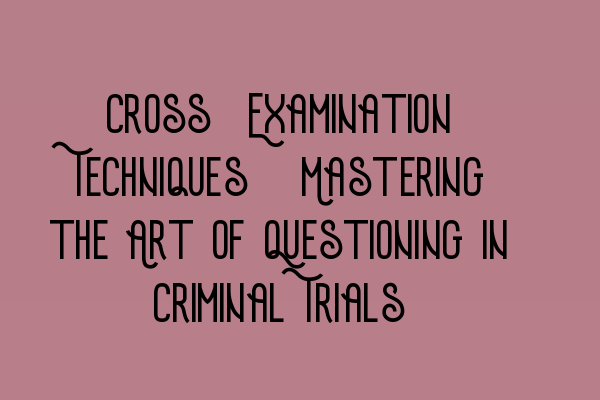Cross-Examination Techniques: Mastering the Art of Questioning in Criminal Trials
Cross-examination is a critical skill for criminal lawyers to possess. It is during cross-examination that the defense lawyer gets the opportunity to challenge the prosecution’s case by questioning the witnesses presented by the opposing side. A skilled cross-examiner can effectively chip away at the prosecution’s evidence, revealing inconsistencies, biases, and weaknesses that can significantly impact the outcome of a criminal trial.
To master the art of questioning in criminal trials, criminal lawyers need to develop effective cross-examination techniques that are both persuasive and strategic. In this article, we will explore some key techniques that can help lawyers enhance their cross-examination skills and increase their chances of success in criminal trials.
1. Preparation is Key
Before stepping into the courtroom, a criminal lawyer must thoroughly prepare for cross-examination. This involves reviewing the witness statements, identifying potential inconsistencies, studying the evidence, and formulating a strategic line of questioning. It is crucial to gather all the necessary information and be well-versed in the case to effectively cross-examine the witnesses.
To ensure thorough preparation, lawyers can take advantage of SQE 1 Practice Exam Questions and SQE 1 Practice Mocks FLK1 FLK2. These resources provide invaluable practice in analyzing and responding to various scenarios that may arise during cross-examination, helping lawyers sharpen their skills and build confidence in their abilities.
2. Control the Narrative
During cross-examination, it is essential for lawyers to control the narrative and guide the witness’s responses. By asking leading questions, lawyers can influence the direction of the testimony and extract favorable answers. Leading questions, which suggest a specific answer, can be a powerful tool in undermining the prosecution’s case and establishing doubt in the jury’s mind.
To improve their leading question skills, lawyers can participate in SQE 1 Preparation Courses. These courses offer comprehensive guidance on improving questioning techniques and provide valuable insights into effective cross-examination strategies.
3. Elicit Inconsistencies and Biases
Cross-examination is about challenging the witness’s credibility and exposing any inconsistencies or biases in their testimony. Lawyers should meticulously analyze the witness’s prior statements and cross-reference them with the evidence presented. By pointing out any contradictions, the lawyer can undermine the witness’s reliability and cast doubt on their version of events.
To enhance their ability to scrutinize witness statements, lawyers can benefit from SQE 2 Preparation Courses. These courses provide comprehensive training in analyzing evidence, identifying inconsistencies, and effectively challenging witness testimony.
4. Adapt to the Witness
Not all witnesses can be cross-examined using the same approach. Lawyers should be flexible and adapt their questioning style based on the witness’s demeanor, background, and vulnerability. Effective cross-examination requires the lawyer to establish a connection with the witness, gain their trust, and tactfully navigate through sensitive topics to elicit the desired responses.
Conclusion
Cross-examination is a skill that separates successful criminal lawyers from the rest. By employing strategic techniques, lawyers can effectively challenge the prosecution’s evidence and unravel inconsistencies in witness testimony. Thorough preparation, control of the narrative, eliciting inconsistencies and biases, and adaptability are all essential components of mastering the art of questioning in criminal trials.
To further enhance your skills in criminal law, check out the following related articles:
- SQE 1 Practice Exam Questions
- SQE 1 Practice Mocks FLK1 FLK2
- SQE 2 Preparation Courses
- SQE 1 Preparation Courses
- SRA SQE Exam Dates
